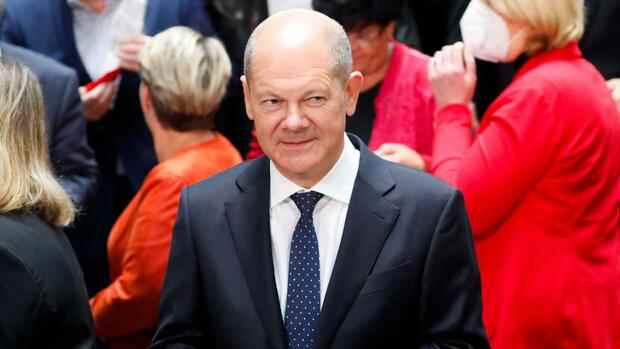Berlin There is a ghost. The specter of the left slide of the SPD. Chancellor candidate Olaf Scholz may have been on stage. But he would only have followed the stage directions from Saskia Esken, Norbert Walter-Borjans and Kevin Kühnert, etched CDU General Secretary Paul Ziemiak again and again during the election campaign.
A left slide by the SPD after the election is by no means just Ziemiak’s fear. Many not only in political Berlin are asking: How left is the SPD? Will Scholz have to make concessions to his party friends now after the election? Doesn’t the SPD’s 6-person exploratory team, in which there are three left-wing parties, show that the party still has an enormous left-wing spin?
In fact, there is nothing to suggest that the SPD is moving to the left. After the election victory Scholz is the undisputed leader of the SPD. He sets the tone, he makes the announcements. Not the party leaders, not Kühnert and not the Jusos.
“After the good result, Olaf is the clear number one,” says a top comrade. “It was already before,” says another and adds ironically: “And that will probably not change with a completely surprising election victory.”
Top jobs of the day
Find the best jobs now and
be notified by email.
A long-time companion of Scholz even says: “The SPD will be surprised how little it will have a say under a Chancellor Scholz. Nobody will have anything to say, except one: Olaf Scholz. “
Not only ardent left in party leadership
Many, including many leftists in the SPD, cannot imagine that: the left wing of the party is supposed to stand still for a year, crown Scholz as candidate for chancellor despite his defeat for the party chairmanship, then support him unconditionally, even when it was not for a long time, and then afterwards nothing for the party left out of the election?
First of all: It has always been a mistake to believe that the SPD party leadership consists exclusively of ardent supporters of a left-wing alliance. That may apply to co-boss Esken. But even her co-boss Walter-Borjans has always shown sympathy for a traffic light between the lines. The picture is also mixed for the two influential party indexes. Hubertus Heil would immediately prefer a traffic light to an alliance on the left.
Election campaigns change parties
Party Vice Kühnert drummed for a left alliance for a long time, but slowly seems to embark on the typical career of every ex-Juso chairman and change from a left rebel to a pragmatic realpolitician. In any case, he rejected the referendum in Berlin on the expropriation of real estate companies.
The party vice has long campaigned for a left-wing alliance.
(Photo: dpa)
But above all: elections and election campaigns not only change parliaments, but also parties. Even before the hot phase of the election campaign, before his candidate coronation, Scholz was the defining figure behind the scenes in the SPD. No initiative by an SPD minister took place without his approval, and he even made announcements to the SPD-ruled countries. With success.
Scholz has a penchant for control mania
Scholz may not be a good communicator, but he’s a good coordinator. The fact that the government work of the SPD ran so smoothly in the grand coalition and that the federal SPD has been closed for a long time is also due to the good work of Scholz’s Vice Chancellery, according to the SPD.
However, Scholz’s tendency to coordinate and plan political processes also has its downsides: Scholz wants to control everything, to decide everything on his own. The companion believes: “At the end of coalition talks, it is Scholz and not the party that will decide on every small person. They’ll look stupid out of the laundry. “
Since the election campaign, which was completely tailored to him, Scholz is no longer the dominant figure of the SPD only behind the scenes, but also in public. With this, the Scholz party has surrendered itself in order to be successful. Now she has to live with this success – and Scholz’s abundance of power.
Also because the pragmatic wing has been significantly strengthened since election Sunday. In addition to Scholz, Manuela Schwesig and Franziska Giffey, two SPD politicians who, like the candidate for chancellor, can do little with left-wing dreams, have won elections. Giffey even explicitly distanced himself from the previous red-red-green Senate in the Berlin election campaign.
Also read:
After their election victories, Giffey and Schwesig will set the tone in the SPD behind the chancellor candidate, together with the other influential SPD Prime Ministers Stephan Weil, Malu Dreyer and Peter Tschentscher, who are also all very pragmatic.
And the Jusos? They are definitely a new power in the parliamentary group. Over 80 Jusos ran in the federal election, almost 50 have moved in.
Scholz is considerate when he wants to
The young candidates would “help to bring a breath of fresh air through the Bundestag”, says Juso boss Jessica Rosenthal, who also moved into parliament and campaigned for a left-wing alliance.
But firstly, not every younger social democrat is automatically very left-wing, and secondly, the Jusos also sense the chance of a change of power. With a view to a looming traffic light coalition, Juso boss Rosenthal built ahead of the election. Other possibilities than a left-wing alliance “in principle not either,” she said.
In explorations and when taking over government, Scholz should try to show consideration for the Jusos, the parliamentary group and his party leadership in order to maintain the unity of the SPD. However: not because he has to or is forced to do so. But on its own initiative. And probably only if he can afford it.
More: Comment – The Chancellery alone will not be enough for the SPD
